Related Topics
Colonial Philadelphia (Pre- 1776)
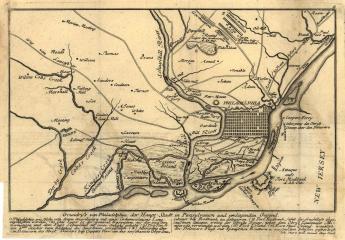 It's surprising to most Americans to learn the American Revolution was not the beginning, but almost half-way through the European settlement. And before the Revolution, there were thousands of years of settlement by non-European tribes. We know more about non-European settlers than we did fifty years ago, but records are still very poor or non-existent, and not likely to catch up very rapidly. History will begin in 1492 for a very long time. Long before that, it isn't history, it's anthropology.
It's surprising to most Americans to learn the American Revolution was not the beginning, but almost half-way through the European settlement. And before the Revolution, there were thousands of years of settlement by non-European tribes. We know more about non-European settlers than we did fifty years ago, but records are still very poor or non-existent, and not likely to catch up very rapidly. History will begin in 1492 for a very long time. Long before that, it isn't history, it's anthropology.
Benjamin Franklin
A collection of Benjamin Franklin tidbits that relate Philadelphia's revolutionary prelate to his moving around the city, the colonies, and the world.
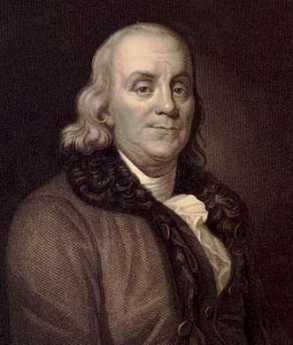
Philadelphia, A Running Commentary
A series of observations in and around Philadelphia by notables over the last three and one-half centuries.
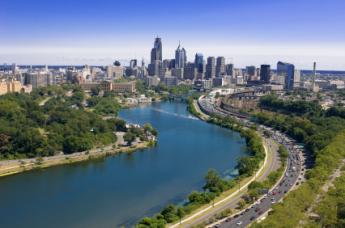
The British Attack Philadelphia
Fighting in the Revolutionary War lasted eight years; for two years (June 1776 to June 1778) Philadelphia was the main military objective of the British.
Conventions and Convention Centers
When you have a big convention center, some circus is always coming to town. Philadelphia has always been a convention town, has had and still has lots of convention sites, and hopes to have more of the kind of famous convention we have had in the past.
Causes of the American Revolution
Britain and its colonies had outgrown Eighteenth Century techniques of governance. Unfortunately, both England and America lacked the sophistication to make drastic changes smoothly.
Tourist Walk in Olde Philadelphia
Colonial Philadelphia can be seen in a hard day's walk, if you stick to the center of town.
Up Market Street to Sixth and Walnut
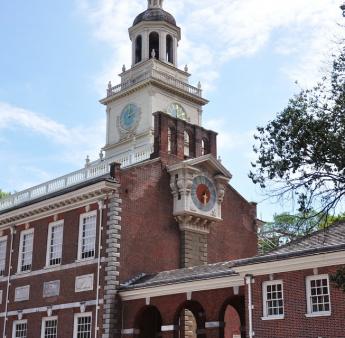 Millions of eye patients have been asked to read the passage from Franklin's autobiography, "I walked up Market Street, etc." which is commonly printed on eye-test cards. Here's your chance to do it.
Millions of eye patients have been asked to read the passage from Franklin's autobiography, "I walked up Market Street, etc." which is commonly printed on eye-test cards. Here's your chance to do it.
Popular Passages
New topic 2013-02-05 15:24:06 description
Philadelphia Reflections (6)
New topic 2017-02-06 21:23:28 description
What Happened in Philadelphia on July 4, 1776?
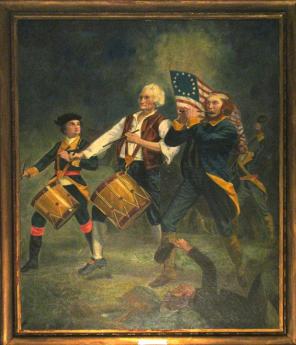
|
| Spirit of 76' |
The American colonies were growing too big, too fast, and the British Empire had too many international distractions, to have smooth relationships across three thousand miles of ocean, using uncertain communications available in the late Eighteenth century. Friction and misunderstanding were inevitable without far more statesmanship than either side thought was necessary. So, when the Continental Congress dispatched George Washington to Boston with troops to defend rebellious Massachusetts at Lexington, Concord, and Bunker Hill, it was hard for the British to believe the colonists were merely helping out one of their distressed neighbors. It seemed in London that the thirteen colonies had united, formed not only an army but a government, and gone to war. In December 1775 England passed the Prohibitory Act, essentially declaring war, and organized a huge invasion fleet to put down the rebellion. It now seems hard to understand the first notice the Americans had of this huge over-reaction was a private letter to Robert Morris from one of his agents in March 1776; no warnings, no negotiations, no attempt to investigate problems and correct them. The British just sent a fleet to settle this problem, whatever it was. It's all very well to say the Americans should have known they were playing with fire. They didn't see it that way; they were being self-reliant, responding to attack. In June 1776 British patrol frigates were skirmishing in the Delaware River; late in the month, British troops landed on Staten Island. The American reaction to all this was a muddle of confusion. A few were delighted, most of the rest were amazed or appalled.
Although the deeper strategic origins of the American Revolution are subtle, complex, and controversial, there is far less muddle about what happened on July 2, 1776, publicly proclaimed two days later. Adopting a resolution written by Richard Henry Lee of Virginia, the Thirteen Colonies stated they had now clarified their goals in the controversy with the British monarchy. For a year before that, the Continental Congress had been corresponding with each other and meeting in Carpenters Hall with the goal of achieving representation in the British parliament -- "No taxation without representation". The model for most of them was based on the Whig agitation for Ireland -- for a local parliament within a larger commonwealth. But the passing of the British Navy in Halifax, Nova Scotia, and then the actual appearance of seven hundred British warships in American waters showed that not only was Parliamentary representation out of the question, but King George III was going to play rough with upstarts. The new goal was no longer just representation, it was independence. If we were going to resist a military occupation at the risk of being hanged as traitors, we might as well do it for something substantial. The meeting had a number of Scotch-Irish Princeton graduates, whose basic loyalty to England had long been divided. Pacifist Pennsylvania, chief among the wavering hold-outs, was mostly won over by its own Benjamin Franklin, who was optimistic the French would help us. Even so, both Robert Morris and John Dickinson refused to sign the Declaration; Franklin persuaded both to abstain by absence, which created a majority of the Pennsylvania delegation in favor. That's a pretty slim majority for a crucial decision. Franklin was soon dispatched back to Paris to make an alliance; Washington was dispatched to hold off that British army in the meantime. Jefferson was designated to write a proclamation, which even after editing is still pretty unreadable beyond the first couple of sentences. Meeting adjourned. This brief account may not qualify as a serious examination of the causes of the American Revolution, but it comes close to the way it seemed to the colonist in the street.
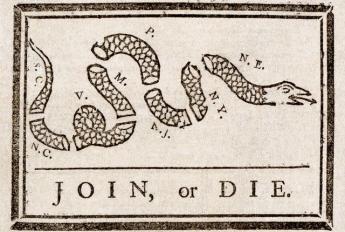
|
| Colonist's Complaint |
The rebels then spent eight years convincing the British they were serious and have been independent ever since. But, just a minute, here. Reflect on the fact that fighting had been going on for a year in Massachusetts, and that Lord Howe's fleet had set sail a month before the Declaration, actually landing on Staten Island at just about the same time as the Fourth of July. Add the fact that only John Hancock actually signed the document on July 4th, and some of the signers even waited until September. You can sort of see why John Adams never got over the idea that Thomas Jefferson had a big nerve implying the whole Revolution was his idea. What's more, there's a viewpoint that New England subsequently had to endure a President from Virginia for thirty-two of the first thirty-six years of the new nation because loud talk from New England still made the rest of the country nervous. Philadelphia may have been the cradle of Independence, but that was not because it was a colony hot for war, dragging others along with it. Rather, it was the largest city in the colonies, centrally located. It had a strong pacifist tradition, and it had the most to lose from a pillaging enemy war machine. When Independence was finally declared the goal, many of Philadelphia's leading citizens moved to Canada.
New England had started hostilities and was about to be subdued by overwhelming force. The Canadians were not going to come to their aid, because they were French, and Catholic, and enough said. What New England and the Scotch-Irish needed were WASP allies, stretching for two thousand miles to the South. By far the largest colony was Virginia, which included what is now Kentucky and West Virginia; it even had some legal claims for vastly larger territory. Virginia was incensed about its powerlessness against British mercantilism, especially the tobacco trade. The rest of the English colonies had plenty of assorted grievances against George III, and almost all of them could see that America was rapidly outgrowing dependency on the British homeland, without a sign that Parliament was ever going to surrender home rule to them. It was perhaps unfortunate New Englanders were so impulsive, but it looked as though a military confrontation with the Crown was inevitably coming. Without support, New England was likely to be torched, as Rome once subdued Carthage.
And the last hope for an alternative of flattery and diplomacy, for guile and subtlety, had stepped off the boat a year earlier. Benjamin Franklin, our fabulous man in London, arrived with the news he had finally had it "up to here" with the British ministry. He was a man who quietly made things happen, carefully selecting his arguments from amongst many he had in mind. In retrospect, we can see that he held the idea of Anglo-Saxon world domination as far back as the Albany Conference of 1745, and could even look forward to America outgrowing England in the 19th Century. His behavior at the Constitutional Convention of 1787 strongly suggests he never completely gave up that long-term dream. Just as Edmund Burke never gave up the idea of Reconciliation with the Colonies, Benjamin Franklin never quite gave up the idea of Reconciliation with England. While John Dickinson and Robert Morris resisted the idea of Independence down to the last moment, Franklin took a much longer view. For the time being, it was necessary to defeat the British, and for that, we needed the help of the French. In 1750, America joined with the British to toss out the French. And then in 1776, we joined the French to toss out the British. Franklin didn't always get his way. But Franklin was always steering the ship.
Originally published: Thursday, July 28, 1994; most-recently modified: Friday, September 20, 2019
| Posted by: IKNIWYOULOVEME! | Apr 23, 2014 12:02 AM |
| Posted by: Egon Werner | Mar 1, 2014 11:16 PM |